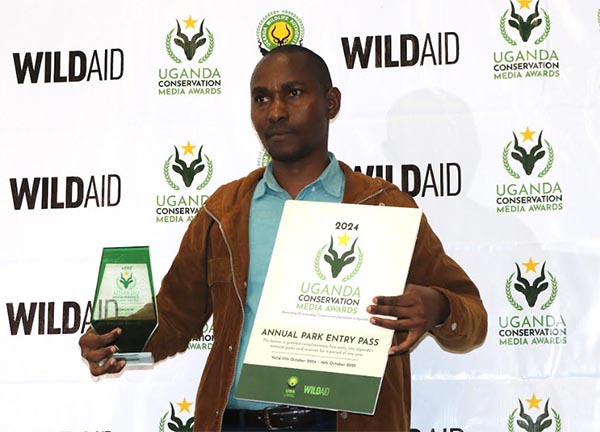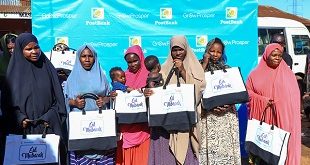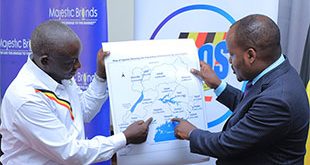
Kampala, Uganda | THE INDEPENDENT | The Independent’s Ronald Musoke emerged winner at the Uganda Conservation Media Awards gala held in Kampala on Oct 16.
For his story titled, “Greatest elephant, pangolin massacre,” Musoke won the Wildlife Crime print/online category. For the effort, he received a commemorative plaque, a certificate, a T-Shirt, a dummy cheque of Shs 5 million, and a free pass to Uganda’s national parks for one year from Prof. James Kalema, the Chairman of the Board of Trustees at the Uganda Wildlife Authority (UWA).
“It’s such a great honour to be recognized by the country’s conservation agency and its partners,” Musoke said. “It feels really good to see that our small efforts towards informing the public of what is happening in both the wild and boardrooms is actually seen, read and even applauded by the public. This award can only inspire me to do more stories that hopefully can inspire many more Ugandans to protect and conserve the country’s rare wildlife resources.”
The awards, now in their second year, are organized by the Uganda Wildlife Authority, the country’s top wildlife conservation agency and, WildAid, a U.S-based non-profit. They are aimed at honouring and recognizing journalists who demonstrate excellence in conservation reporting.
Through these awards, UWA and WildAid seek to inspire and encourage more journalists to engage with conservation issues and to delve into those issues more deeply. Besides raising awareness among the public and policymakers about the country’s rich biodiversity and the contemporary challenges it is facing, the other aim of the awards is to ensure that stories of Uganda’s wildlife and ecosystems reach a wider audience.
Quality entries
The second edition of the awards saw a significant increase in the quality of entries, highlighting the growing interest and engagement of journalists in conservation. The competition was tight, with submissions covering key topics such as poaching, human-wildlife conflict, and community-driven conservation efforts.
“The level of competition this year was extremely high, and it’s clear that more journalists are engaging deeply with conservation issues,” said Bashir Hangi, Uganda Wildlife Authority’s Communications Manager. “Their work is critical in shaping public opinion and promoting action.” For the first time, a further 13 entries received commendations, as the judges recognised the high quality of the submissions.
“From films that showcase the beauty and fragility of our ecosystems, to radio pieces that educate and inspire people to make a change in their communities, to in-depth journalism that holds agencies accountable; each of you has contributed something valuable. You have helped create dialogue around wildlife conservation that resonates not only within Uganda but beyond its borders.” Maz Robertson, the WildAid East Africa Representative told the award winners.
“The power of media to influence behaviour, to inspire people to take action, and to spread awareness is limitless,” she added. “As we move forward, let us continue to harness this power. Let us keep telling stories that matter, stories that will ensure that future generations inherit a world as rich and biodiverse as the one we enjoy today.”
“Journalists have been instrumental in raising awareness about critical issues such as poaching, habitat degradation, and human-wildlife conflict,” UWA Executive Director Sam Mwandha told the media. “Your work helps bridge the gap between conservationists and the communities we serve.”
In his key note address during the awards ceremony, Martin Mugarra Bahinduka, the Minister of State for Tourism, Wildlife, and Antiquities noted that the media’s influence is essential in encouraging Ugandans to understand, appreciate, and act to protect the country’s wildlife and natural resources.
“From the stories told in the media, there is a big threat towards conservation. Very few people understand conservation in the country,” he said. “It’s very difficult to convince a human being why you cannot allow them to degazette part of a park and cultivate food because you want animals to live; it just doesn’t make sense to so many people and, it is something we are grappling with. So, it is important that the media continue to speak for the wildlife and also the generations that will come after,” said the minister.
Prof. James Kalema, the Chairman of the UWA Board of Trustees, pledged continued support for the awards, noting the impressive quality of entries this year. “The UWA Board remains committed to supporting this initiative, recognizing that media professionals play a key role in driving Uganda’s conservation efforts forward,” he said.
Prof. Kalema noted that the UWA Board appreciates the media’s power to inform, educate and inspire action. Your work is indispensable; your reporting raises awareness on critical conservation issues and helps mobilise public and public policy.
“Through stories, documentaries, magazine, you bring to life the realities of human-wildlife conflict, poaching, habitat destruction, and tireless efforts of communities and conservationists to protect these resources. Your ability to inform the public and inspire action is crucial to building a collective responsibility for Uganda’s wildlife conservation.”
“At UWA, our mission is to conserve Uganda’s wildlife and protected areas for the benefit of people in the present and future generations. This mission cannot be accomplished by one institution; it requires strong partnerships with communities, conservation organizations, development partners, government, and of course the media.”
“Tonight, we celebrate the important role the media plays in amplifying our conservation efforts, and we commit to deepening this partnership. We face significant conservation challenges such as climate change, habitat degradation, illegal wildlife trade, and growing pressures on wildlife habitats.”
“But with collaboration, determination, and the media’s powerful role in bringing to light these issues, I believe we can overcome them. The media is vital in driving the momentum needed for effective conservation action,” he said.

Full list of winners at the 2nd edition of the Uganda Conservation Media Awards
- Wildlife Photograph of the Year: Raymond Kagumire – “Snared hartebeest”
- Wildlife Protection (Print/Online): Julius Luwemba – “Sgt. Adong drops gun after 35 years of protecting wildlife” (New Vision)
- Wildlife Protection (Radio): Victor Andama – “Reintroduction of white rhinos back to East Madi Wildlife Reserve” (Voice of Madi FM)
- Community Conservation (Print/Online): Okello Jesus Ojara and Dramadri Frederick – “How passionate community members rescued abandoned Ajai Wildlife Reserve” (TND News Uganda)
- Community Conservation (Radio): Wambi Michael – “Waking to the call of the elephant in Uganda” (Uganda Radio Network)
- Community Conservation (TV/Video): Immaculate Amony and Eddy Olwa – “Community action for human-wildlife conflict” (UBC TV)
- Wildlife Crime (Print/Online): Ronald Musoke – “Greatest elephant, pangolin massacre” (The Independent)
- Wildlife Crime (Radio): Benjamin Jumbe – “Kamasanyu the wildlife advocate” (KFM)
- Habitats & Environment (Print/Online): Richard Drasimaku – “The quest for reintroduction of white rhinos in Ajai Wildlife Reserve” (West Nile News)
- Habitats & Environment (Radio): Chowoo Willy – “Whispers in the wilderness” (Choice FM)
- Habitats & Environment (TV/Video): Akiza Eli and Andrew Tushabe – “How climate change has affected birds in Lake Mburo National Park” (TV West/Vision Group)
 The Independent Uganda: You get the Truth we Pay the Price
The Independent Uganda: You get the Truth we Pay the Price



